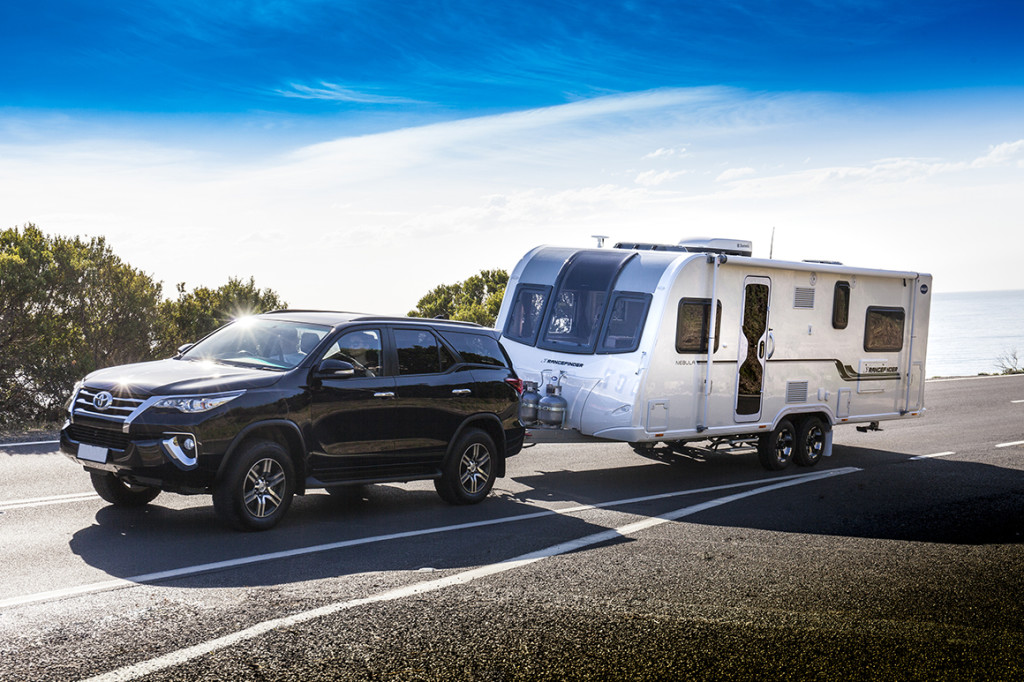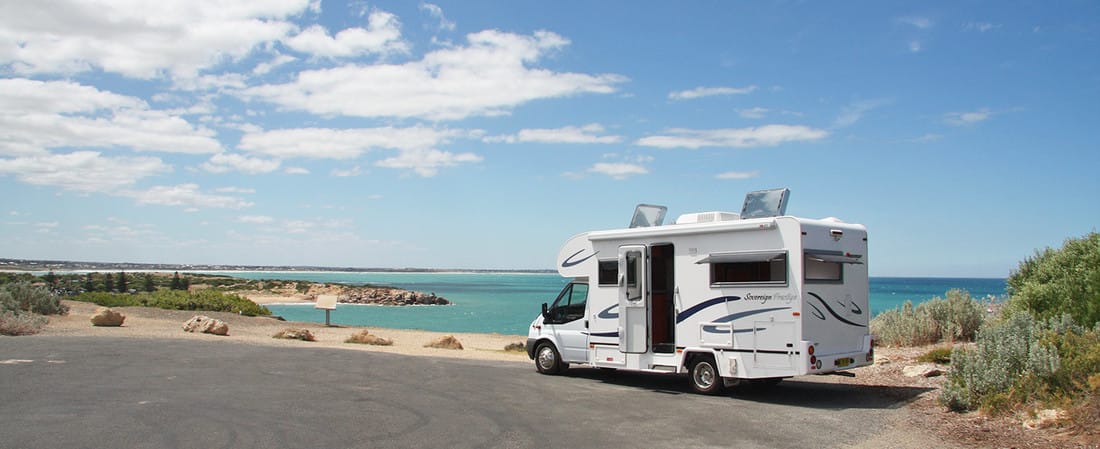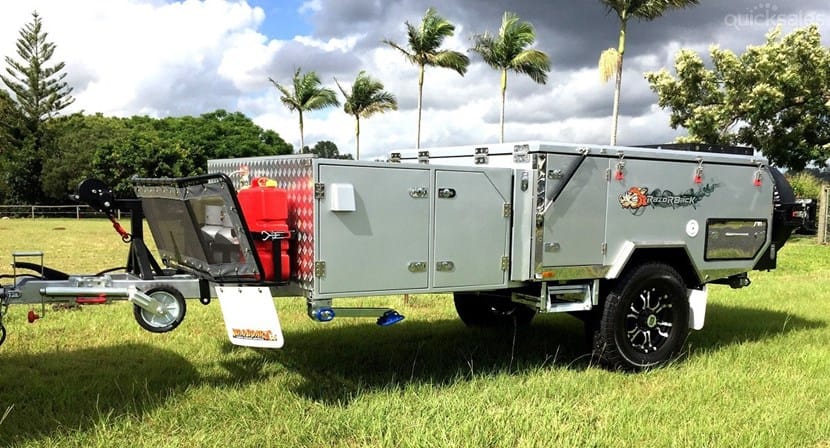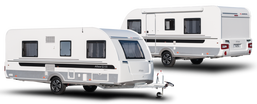Self-drive travel is without a doubt the best way to see Australia. Sure, you could fly to Port Douglas, Qld, or to Broome, WA. But they say the journey is the destination. And when you’re exploring a country as diverse, large, and downright beautiful as ours, ain’t that the truth.
But the question of your accommodation while on the road remains. So what’s it going to be, caravan, motorhome, or camper trailer? There are good reasons for each… and, unfortunately, drawbacks, too. Let’s take a look at the pros, cons and considerations behind these main types of RV.
CARAVAN HIRE
The humble caravan is the most popular type of RV in Australia, though it’s not so humble any more. Dishwashers, spas (yes, spas), washing machines and bathrooms can all be found in Aussie vans. Ultimately, a caravan is only limited by its size and, importantly, the potential weight of the finished product.
Before deciding if a caravan is right for you, carefully consider your needs and how you will travel. If it’s just the two of you, do you need that ostentatious 24-footer or will a well-appointed, comfortable 18ft van do the job just as well? The heavier the van, the harder your tow vehicle’s engine will have to work and the more fuel it will drink. The ongoing costs in tow-vehicle maintenance and fuel need to be part of the equation.
Speaking of the tow vehicle, don’t assume the car in your garage is up to the task. Ensuring your car can legally and safely tow the van is one of the most important factors in play.
The need to periodically hitch and unhitch your van is inescapable, and there may be certain items you’ll have to purchase to improve the towing experience, such as a weight distribution hitch and extension mirrors.
But once you’ve matched your tow vehicle to your caravan and everything is well set-up, what are the advantages of choosing a caravan over a motorhome or camper trailer?
First, a trailer such as a caravan can be left at the holiday park when you want to go for a drive around town. This mightn’t sound particularly beneficial, but consider how you’d cope if you had to pack up much of your campsite because you ran out of milk and needed to drive into town, as you would if your RV was a motorhome.
Compared to camper trailers, caravans (generally speaking) are simpler and quicker to set-up, offer more ‘home-like’ comforts, such as an inside lounge, bed, large fridge, built-in cooking facilities, a washing machine, and even heating. Many vans even have offroad capabilities though their inherent size might preclude touring tight bush tracks and the like.
So if comforts and living space are important to you, not to mention the freedom to drive your tow car whenever needed, a caravan makes good sense.
PROS
- Home-like comforts
Internal living space - Ability to use tow vehicle as required
CONS
- A new tow vehicle may be required, or a smaller caravan to match existing vehicle
- Size and weight will add to fuel and vehicle servicing expenses
- Additional items, such as a weight distribution hitch, friction coupling, etc., may be required
PRICING
MOTORHOME RV HIRE
But the good news is, there’s a lot of very special motorhomes that can be driven on a standard licence, with all the space and comforts of top-end caravans.
In terms of benefits, the biggest is the no-fuss factor. No towing (unless you’re A-framing a little Suzuki or towing a trailer), no hitching and unhitching. Just pack your gear, turn the ignition, and hit the road. For a lot of people, this holds a lot of appeal.
Unfortunately, for most motorhomers, their rig is their primary mode of transport. And this means packing up much of the campsite to get that litre of milk from town. However, this is also why they make portable foldable bikes and similar portable means of transportation. It’s also why many tow a little hatchback behind their motorhome.
If pack-up-and-go touring appeals, and the idea of towing makes you uncomfortable, a motorhome may be the answer. Just try to remember to get the milk before setting up camp…
PROS
- Easy touring – no towing is necessarily involved
- All the space and comforts of a caravan
- Very easy to set-up. Park, plug in, and relax
CONS
- Limited transport options without packing up camp
CAMPER TRAILER HIRE For CAMPING
Typically light (anywhere between 1000kg and 1500kg Tare, if not less), a camper trailer is a good option if you like to keep the weight behind your vehicle light and thereby reduce your fuel bill. The lower towing profile of a camper trailer, as compared to a caravan, is said to reduce drag and therefore improve fuel efficiency, too. The inherently lighter weight of camper trailers also makes it more likely you won’t need to upgrade the tow vehicle UNLESS you're towing a lightweight caravan.
A new budget camper trailer will inevitably require a fair amount of manual setting-up, at least 15 to 30 minutes’ worth. Think canvas awnings, telescopic tensioning poles, etc.
Camper trailers are, typically, much more manoeuvrable than caravans, and a good offroad trailer should follow your 4WD almost anywhere, even on the tight bush tracks that’d trip up an offroad caravan. However, most camper trailers aren’t known for offering the comforts of home. You’ll be cooking in the great outdoors, sleeping next to canvas walls, doing midnight toilet runs (unless you’ve stashed a portable toilet somewhere) and generally living much closer to nature.
If you don’t mind some campsite fettling, want to be closer to the great outdoors, and need to keep the towed weight as light as possible, why not consider a camper trailer hire? They offer a very different camping hire experience to motorhomes and caravans, but for some people, that’s the point – and there’s nothing wrong with that. Check out our 2016 JAYCO swan camper trailer page here
PROS
- Lightweight and easy to tow
- Easier to manage in offroad conditions (but make no assumptions here – not all camper trailers are purpose-built for offroad touring)
- They offer a more ‘authentic’ camping experience
CONS
- Will probably require you to carry more gear, such as a portable table and chairs
- Significantly more setting-up is required than a caravan or motorhome (depending on the trailer)




 RSS Feed
RSS Feed

